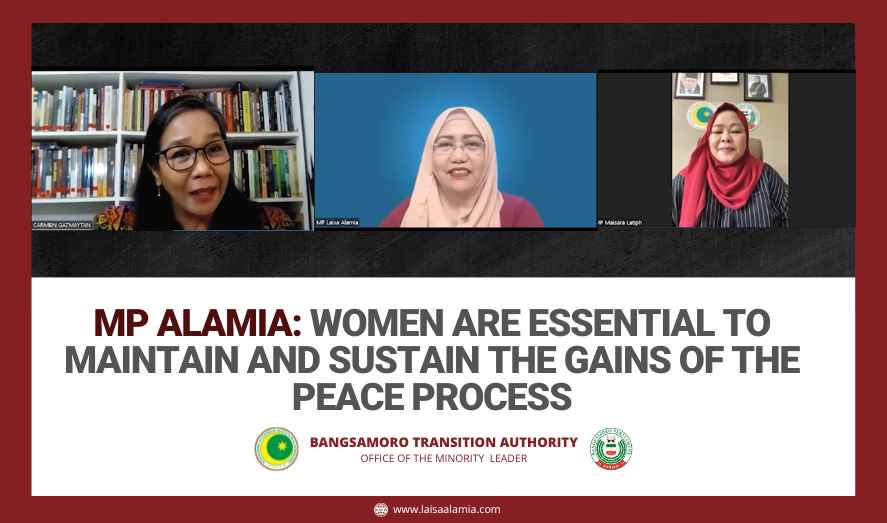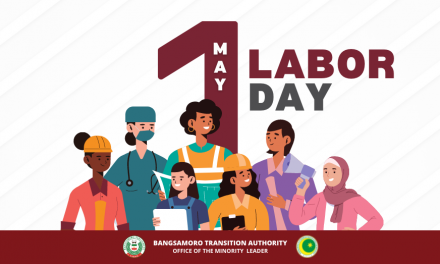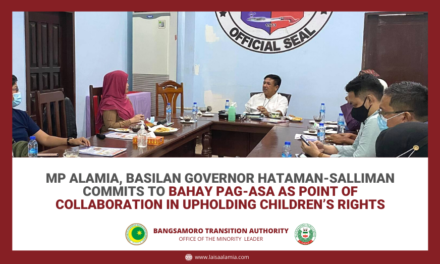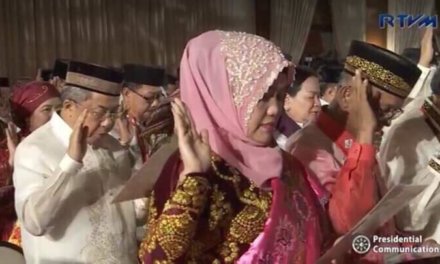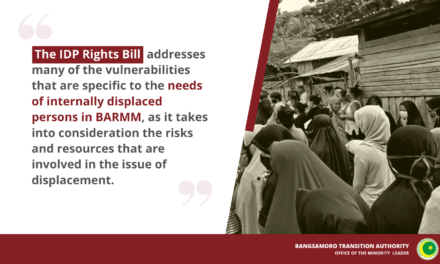On Friday, August 5, Minority Floor Leader MP Atty. Laisa Alamia Women talked to Carmen Lauzon-Gatmaytan as a guest in Women Say Peace, a monthly live show that aims to provide a platform for women to talk about issues and address various concerns in the Bangsamoro.
The show is organized by the Gaston Z. Ortigas Peace Institute, Women Engaged in Action on UNSCR 1325, with support from Oxfam.
Its most recent episode, titled Kababaihang Bangsamoro 2022-2025: Push Pa More, focused on what the Bangsamoro Autonomous Region in Muslim Mindanao (BARMM) has achieved in the first three years of the political transition and what remains to be done as the work continues until 2025, particularly on issues related to women’s rights and welfare. Together with her in the program was MP Atty. Maisara Dandamun-Latiph, also a member of the Bangsamoro Transition Authority (BTA) Parliament.
Significant achievements in the first three years
When asked about the BARMM’s most important achievement in advancing the rights and welfare of women in the region, Minority Floor Leader MP Atty. Laisa Alamia said that “looking back, I believe our biggest win over the past three years is the creation of the Bangsamoro Women Commission.”
The BWC was institutionalized through Bangsamoro Autonomy Act No. 8 in 2020, and it was among the first three agencies that the Bangsamoro Transition Authority created. The commission is the BARMM’s “leading institution for women and gender and development,” she explained.
“As a policy making, coordinating, and monitoring body, it is tasked to render services to the women of the Bangsamoro, especially towards their empowerment, welfare, and rights protection,” MP Alamia noted.
The establishment of the BWC has led to “several interventions for gender equality and women empowerment,” which include the formulation of the first Bangsamoro Regional Action Plan for Women, Peace, and Security (RAPWPS). According to MP Alamia, it is a two year plan which “seeks to give more space for Bangsamoro women, both in the peace process and protection of human rights.”
“I personally hope that through this plan we can have more seats for women not just in the peace table, but in other public decision-making spaces.”
MP Alamia also noted the “expansion of regional social services” which she described as “very close” to her heart. This includes having specialized social programs for women and disadvantaged sectors.
In 2022 alone, more than 76 million pesos was appropriated for the Bangsamoro Women Commission alone. Other appropriations for women’s programs can be found across regional line agencies, including under the Ministry of Health, Ministry of Science and Technology, and the Ministry of Agriculture, Fisheries, and Agrarian Reform. The Bangsamoro Human Rights Commission have women’s rights education programs, and the women’s welfare program under the Ministry of Social Services and Development.
Coordination with the national government
According to MP Alamia, the RAPWPS is doubly important because it supplements the national government’s third-generation action plan on Women Peace, and Security.
“It is also the regional government’s contribution to our commitment in upholding the UN Security Council’s Resolution No. 1325 and 1820, both of which call for women’s participation in peacebuilding efforts and the protection of women and girls against gender-based violence in times of conflict.”
She also noted the”remarkable feats” at the national level in terms of policy, including the passage of Republic Act No. 11596 which criminalizes child marriage, Republic Act. No. 11648 which raises the age of sexual consent, and Republic Act No. 11862 which amends the anti-trafficking in persons law.
“I mention these laws because these are very essential to our fight in protecting and upholding the rights of Bangsamoro women and girls,” she emphasized.
There have been a number of democratic reforms and shifts in the regional government since the political transition began, MP Alamia explained, and among these is the shift to a parliamentary form of government because it answers the question of how women can better engage in the political processes in the Bangsamoro regional government.
“This shift allows women to have a more meaningful and substantive representation in government,” MP Alamia said. “We have a party system that will establish post-transition doors for women leaders and groups to form or join political parties. There are also reserved seats for sectoral representatives, including the women sector.”
Preparing for the future
MP Alamia notes, however, that the reforms embedded in the parliamentary system of the regional government “will not be open to us until we have the first parliamentary elections in the BARMM in 2025.”
“Nevertheless, we have to underscore the importance of these formal institutions because they are vital in pursuing the women’s agenda, and we cannot represent the genuine interests of the Bangsamoro women without giving them the platform and space to participate and be represented,” she stressed.
“We need to get more women to claim their space in policy making processes so we could have more gender-responsive policies,” MP Alamia said.
To help make this possible, MP Alamia referred to the Women Parliamentary Caucus Bill, which she filed in 2020 with the support of her fellow women legislators in the Bangsamoro Parliament. “This is the only bill under the women legislative portfolio in the BTA which deals directly with women and gender issues.”
The said bill seeks to establish a venue for women in the parliament to unite and consolidate representation for women. “It crosses political divides in order to develop and sharpen a women’s agenda, and build and mobilize political consensus to achieve meaningful progress for women’s issues, gender equality, and gender justice.”
MP Alamia also referred to her work in the Task Force for Decommissioned Combatants and their Communities (TFDCC) where she sought the increased participation of women in the ongoing decommissioning process. She also pushed for the inclusion of women members of the Bangsamoro Islamic Women Auxiliary Brigade (BIWAB) in the Joint Peace and Security Team (JPST) as a response to the clamor of women’s groups to be part of maintaining and sustaining the gains of the peace process.
While the notion that women cannot take part in these processes still exists, MP Alamia is determined to prove the naysayers wrong. “We are women, and we are Moro women. We should prove that we could do this,” she asserted.

